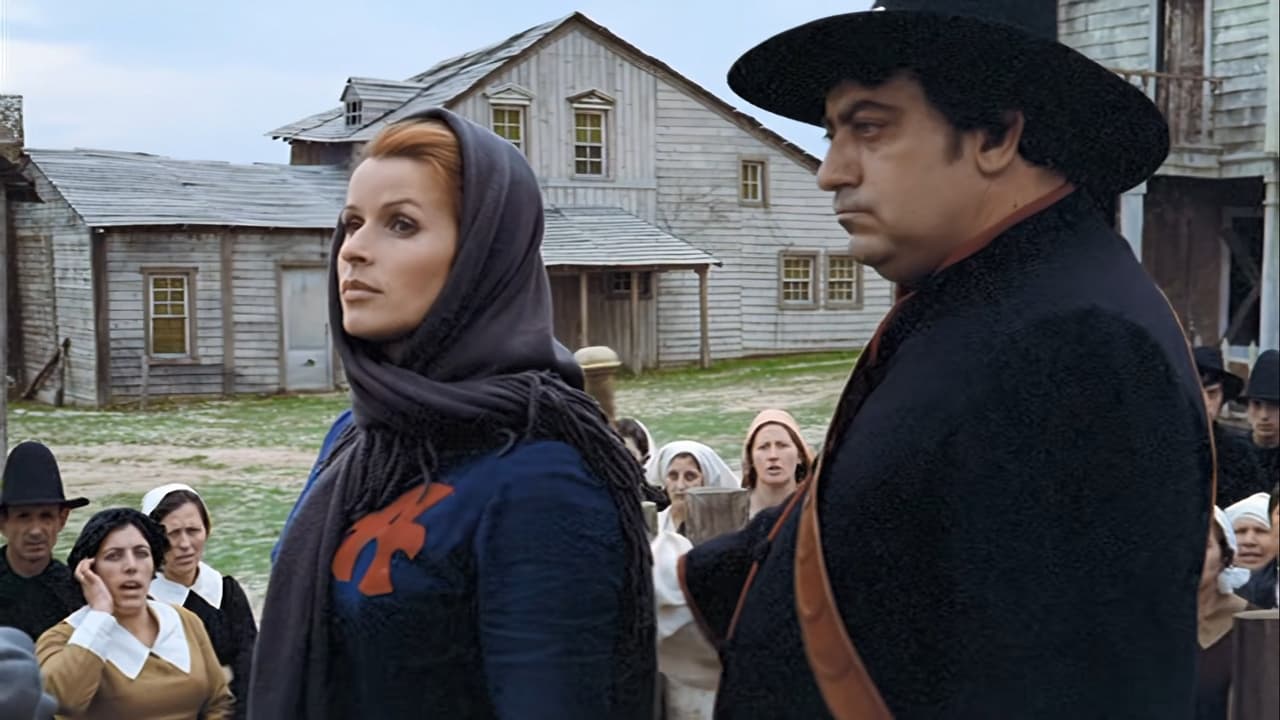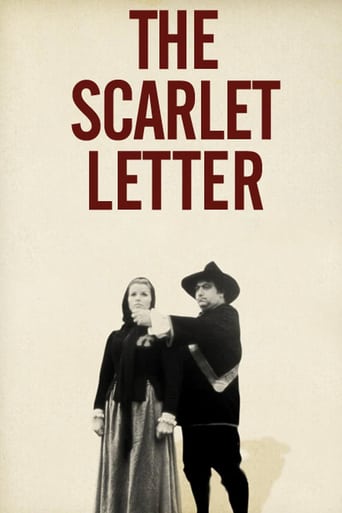

Who payed the critics
... View MoreI cannot think of one single thing that I would change about this film. The acting is incomparable, the directing deft, and the writing poignantly brilliant.
... View Morea film so unique, intoxicating and bizarre that it not only demands another viewing, but is also forgivable as a satirical comedy where the jokes eventually take the back seat.
... View MoreActress is magnificent and exudes a hypnotic screen presence in this affecting drama.
... View More"Der scharlachrote Buchstabe" or "The Scarlet Letter" is a collaboration between West Germany and Spain and the outcome was a German-language film from 1973. The director is Wim Wenders and he is also one of the many writers who worked on this one. His collaborator on the screenplay was Bernardo Fernández and it is an early career effort from him that also explains Spain listed as a production country. The movie is based on a novel by Nathaniel Hawthorne, who was already dead for over a century when this film was made. It runs for 90 minutes exactly and German film fans will immediately recognize lead actress Senta Berger as well as little Yella Rottländer and Rüdiger Vogler with whom Wenders worked on many occasions. Hans Christian Blech is probably not too known anymore today, but still gives a good performance. Foreign audiences will most likely immediately recognize Lou Castel who plays something similar to a love interest to Berger's character.This is a film set in the 17th century and the story of a woman who gets humiliated because she has a child born out of wedlock. Things get even more complicated when her former husband returns into her life, but only with malicious intentions as he tries his all to find out who is the one that got her pregnant. The answer is: the local priest, which makes the situation even worse, even if nobody (except the audience) finds out about it for almost the entire film. I must say I enjoyed the watch. The actors were good and even if there was a questionable moment or situation in terms of realism here and there (it's okay though, nothing too bad and with some fantasy you can probably explain each of these moments to a somewhat credible degree), it was a convincing watch overall. It was easy to care for them, but Wenders still does not go for cheap emotional affection when it comes to the relationship between characters and audiences, but he goes for convincing portrayals and the characters with all their shades make very much sense. The cinematography is occasionally stunning too. I am a bit surprised this is nowhere near as famous as Wenders' most known works as it has depth, creativity and wit as well as nice dramatic tension from start to finish that will have you on the edge of your seat occasionally. Maybe the reason is that the real moments of greatness and extraordinarily memorable situations can't really be found here. It is still one of the best I have seen from Wenders so far and he proves that he can also make quality period pieces, a genre that he has not touched that much I guess. I certainly recommend the watch.
... View MoreI watched this film as part of my lovely Wim Wenders Collection boxed set, with eight films/documentaries, which I'm slowly working through.As an English film lover, who's so used to 'our' often excellent dramas of old, that the thought of a German one seems quite odd and with Wenders normally associated with more contemporary and thought-provoking subjects, perhaps surprising, too.Such films are never going to be my favourites but I can tell immediately that his version here of the Salem-set melodrama looks the part, is well-made and convinces in its period detail. Some of the coastal scenery is impressive, too, with quite a Danish feel, to my eyes. The story is most likely to be a familiar one to those seeking out this, so I don't feel the need to elaborate too much on this aspect. As the central character Hester Byrne, Senta Berger looks attractively regal, but with a distant, cool look and the main men-folk are interestingly featured, facially (in other words, a bit ugly!) but in a not unattractive way. Another reviewer has talked about a heavy musical score which they thought hampered it - true, but this is suited to a slow-moving period drama, as it's all orchestral and musically fitting but also keeps the movie flowing along better. Visually, in parts, it could be rather static otherwise.As I said, I'm no expert on period drama, nor on this story and haven't read the source material, so cannot say how faithful it is. However, it is a well presented, good-looking drama with a good cast and the subtitles present us with a fairly well written script. It is not as dingy and dark as many of such ilk, specially from the 70s, that I've come across and whilst Wenders will never be known for such, his 1973 (so, early) adaptation is well worth watching if you either enjoy the literary source, Wenders himself or indeed, good period drama. The German dialogue will put some off, as will the requisite subtitles and those Wenders fans expecting something more modern, or snappy will be disappointed, possibly very much so.
... View MoreThis version of "The Scarlet Letter" is no more faithful to Hawthorne's novel than most of the others, but in its own way it's utterly magnificent.Hawthorne's gloomy? Well, Wenders makes Hawthorne look positively cheerful! The film begins with Pearl about seven years old, and Hester is summoned to stand on the scaffold in what seems to have been some kind of annual ritual for the town elders and clerics to demand that she reveal the child's name. It's positively sadistic. At least Hawthorne only subjected Hester to one such public humiliation.But it's Senta Berger's performance that makes this film such an absolute stand-out. She generally appears heavily wrapped up in clothing, and here's where the desolate Portuguese coast comes in so nicely, justifying such heavy clothing as protection against the wind and the cold. But it also comes across as if Hester is trying to wrap herself so heavily to suppress her own womanly sexuality. It's much like survivors of abuse, who often "overdress" in a form of psychological protection, almost as a kind of armor. And make no mistake, Hester is clearly a victim of abuse, condemned for her sexual expression and now reacting to that condemnation with such heavy self-defense against any emotional contact with those who have shunned her.What this "cover-up" of her sexuality does is make it all the more impressive when Hester uncovers her hair and lets it flow down her back in the "forest scene" with Dimmesdale. For at least a few moments, this woman is finally finding some freedom, and it's especially impressive with that combination of gentleness and extraordinary beauty that Senta Berger manages to project as she "lets her hair down."There's so many wonders to this film, especially with this wondrous performance by Senta Berger. I can understand that someone might dislike the constant background music. If I knew German and were trying to follow the dialog, I'd probably find it distracting. But since I'm simply following the subtitles, I actually found this constant background music a reinforcement to the extreme claustrophobic pressure on Hester's person-hood throughout this movie. Yelena Samarina (whom Wenders apparently wanted for the role of Hester but was refused by his financial backers) is fascinating as "Mistress Hibbins," playing the role non-traditionally as the governor's daughter.And Hans Christian Blech is also a fascinating Chillingworth, but his is not the traditional demonic portrayal of the betrayed husband. Instead, he's the "rational" investigator, the kind of "scientific detective" who would tear wings off a butterfly to see how the creature will react. All in all, he's actually even more evil than Hawthorne's portrayal, evil in a coldly and unemotionally "scientific" kind of way.The one flaw in this movie is Lou Castel as Dimmesdale, who I actually think is the most difficult of all characters to cast in any of the film versions. The problem with Dimmesdale is that he can't be a "hunka hunka" (like Gary Oldman in the 1995 version with Demi Moore) or you wonder why he doesn't just take charge of the situation and set everything to rights. On the other hand, he can't be such a wimp that you start wondering whatever it was that Hester saw in this poor slob in the first place. Well, Lou Castel certainly doesn't err on the "hunka hunka" side, but I for one do wonder what any woman would see in the Dimmesdale that he portrayed!I'm biased. I adore Meg Foster and think her performance in the 1979 TV-miniseries is the greatest portrayal of Hester imaginable. Unfortunately, the 1979 miniseries, though literally faithful to Hawthorne's novel, was flawed by its length which resulted in a loss of intensity. The Wenders version, on the other hand, is painfully and claustrophobic-ally intense, and Senta Berger's performance is one that draws the viewer literally into inhabiting Hester's own person and viewing all of Salem through her eyes.You'll find VHS tapes of this on eBay. The video isn't as sharp and crisp as I might like, but since it hasn't been reissued in a better version, be happy for what you can find and snap it up as soon as you can. This film is an absolute glory.
... View MoreWenders has made some extraordinary films, but this is not one of them. Low budget, poor acting, and a terrible score render this film a total failure; the subtle intermixture of fantasy and reality that is so characteristic a trait of Hawthorne's novel is wholly lacking in Wenders' adaptation which comes dangerously close to unintended parody at times.
... View More